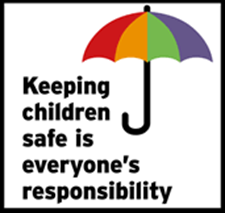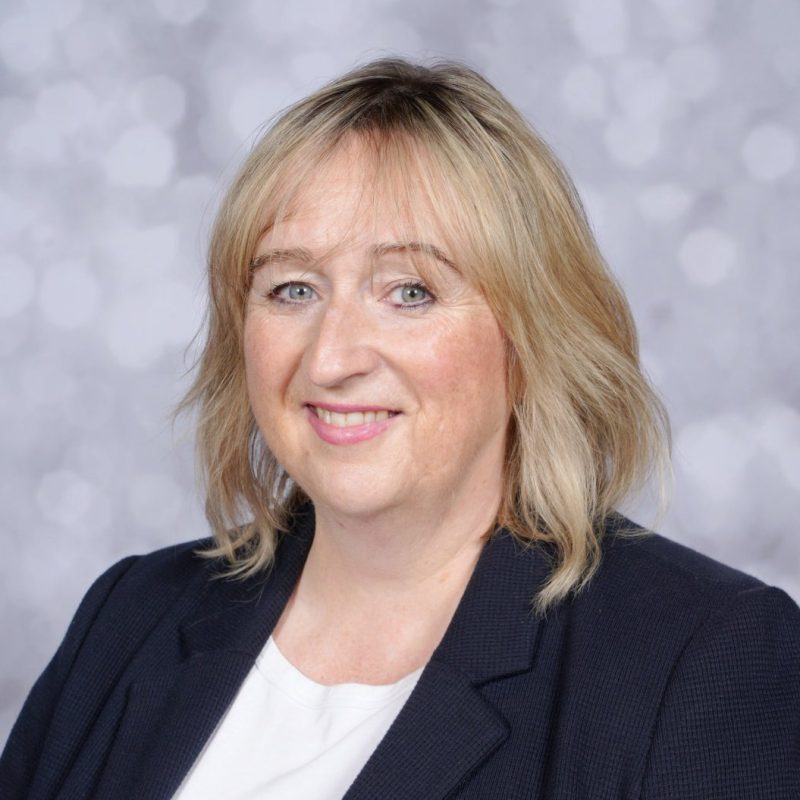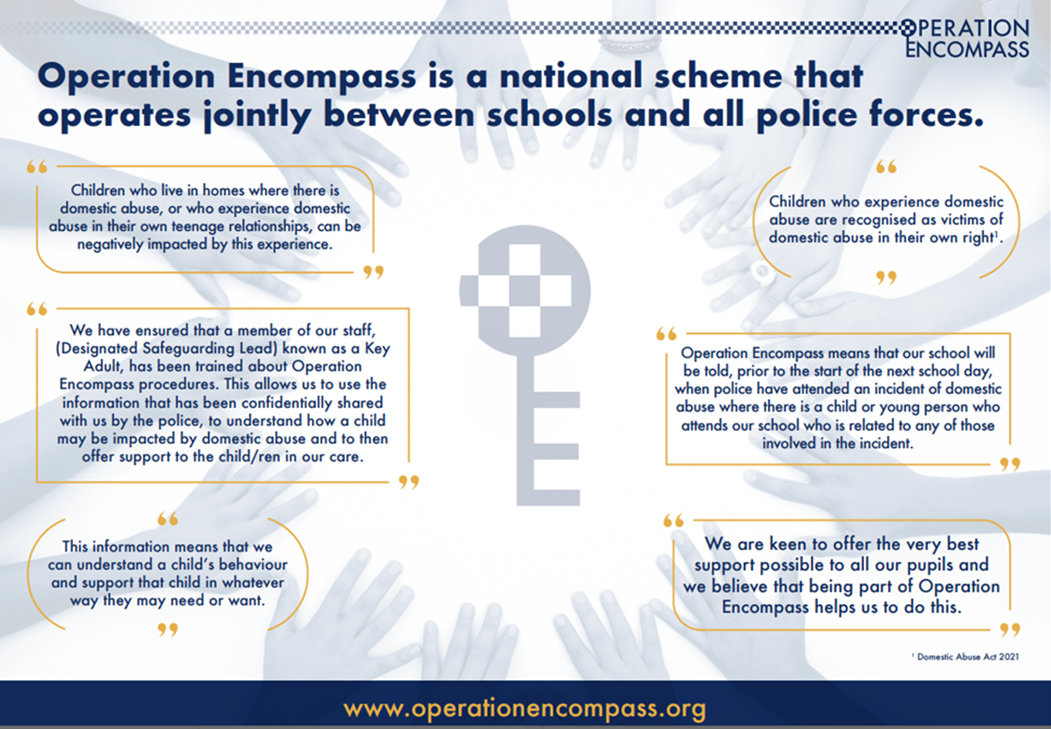Safeguarding
It is every school’s statutory responsibility to safeguard and promote the welfare of children, as outlined by the DfE in its publication “Keeping Children Safe in Education.” This means that a school must protect children from maltreatment, prevent impairment of children’s health or development, ensure that children grow up in circumstances consistent with the provision of safe and effective care and take action to enable all children to have the best outcomes.
Gisburn Road School follows all guidance set out in the Keeping Children's Safe in Education policy, set by the Department of Education.
All staff receive Annual Safeguarding Training and receive a certificate for this. All governors receive Strategic Safeguarding and Prevent Training and this is added to their record on Governor Hub automatically.

At Gisburn Road Primary School we ensure that everyone who comes into contact with children and their families are clear on the role that they play in safeguarding children. Gisburn Road Primary School is committed to providing a safe and secure environment for all children, staff and visitors. All staff have a responsibility to identify children who may be in need of extra help or who are suffering, or are likely to suffer significant harm. All staff then have a responsibility to take appropriate action, working with other services as needed.
Every member of staff receives annual training on Safeguarding and Child Protection policies and procedures and additional training on aspects such as online safety, PREVENT (the Government's approach to stopping radicalisation) and other current issues. Regular training throughout the year helps staff stay in touch with changes, concerns and new developments. In addition, we promote an ethos where children and adults feel confident about sharing their concerns about their own safety or the well-being of others.
Key People

The Designated Safeguarding Lead is Mrs Laura Toor

Mrs Nicola Walker is a Deputy Designated Safeguarding Lead

Miss Sarah Smith is a Deputy Designated Safeguarding Lead

Mrs Susannah Whittaker is a Deputy Designated Safeguarding Lead

A Governor responsible for safeguarding is Mrs Rachel Waddington (the Chair of the Governing Board)

Another Governor responsible for safeguarding is Mrs Caron Longdon.
Operation Encompass
Gisburn Road Primary is part of Operation Encompass:
Operation Encompass is a unique Police and Education early intervention safeguarding partnership which ensures that a child or young person's school or college is informed, prior to the start of the next school day, that there has been a domestic abuse, vulnerable child or missing incident to which the child or young person has been exposed, and which might then have an impact on them in school or college the following day.
The Encompass Leads are: Mrs Walker and Mrs Toor
Prevent
Prevent is the title for a procedure across England which aims to prevent radicalisation.
Please report radicalisation if you:
- Become aware of an individual you feel is vulnerable to radicalisation
- Suspect someone is being radicalised or encouraged to support terrorism
- Are experiencing pressure from others about this
There are various support channels for terrorism threats:
Call 999 in an emergency if you need police assistance.
For advice on preventing radicalisation or reporting concerns in Lancashire please email: concern@lancashire.pnn.police.uk
Prevent team: 01772 413398
Police non-emergency number 101
Anti-terrorism hotline 0800 789 321
More information can be found on the Lancashire Constabulary website
Counter Terrorism Policing safeguarding website is aimed at family and friends to encourage them to share concerns that a friend or loved one might be vulnerable to radicalisation. The website aims to help increase Prevent referrals from family and friends into the police by increasing awareness, trust and understanding of the police’s safeguarding role.
Safeguarding Policy
There are three main elements to our Safeguarding and Child Protection Policy:
Prevention
Creating a positive school atmosphere, teaching and pastoral support to pupils where children have opportunities to have a voice and that their wishes and feelings are listened to and taken into account.
Protection
By following agreed procedures, ensuring staff are trained to recognise possible signs and symptoms of abuse and are trained and supported to respond appropriately and sensitively to child protection concerns.
Support
To pupils and school staff and to children who may have been abused.
The policies cover all areas of school life and include:
- Staff & Visitors
ensuring they are vetted, informed and trained.
- Children’s Behaviour
promoting safer and happier behaviours and lifestyles.
- Parents and Carers
promoting links and supporting families.
- Premises
keeping them safe, pleasant and fit for purpose.
- Curriculum
providing positive learning experiences.
- Outside School
ensuring safer activities and environments outside school.
Further reading
For further information please find our Safeguarding Policy and a child friendly Safeguarding Policy:
Information Sharing
We have an obligation to obtain necessary information from parents in advance of a child being admitted to school, including:
- emergency contact numbers;
- the child’s special dietary requirements, preferences or food allergies the child may have;
- the child’s special health requirements;
- information about who has legal contact with the child; and who has parental responsibility for the child.
Written parental permission is requested, at the time of the child’s admission to the provision, to the seeking of any necessary emergency medical advice or treatment in the future.
Staff
Safer recruitment
We follow strict procedures to ensure that everyone who works with our children is vetted, keeping our children as safe as possible. Ongoing checks and ‘whistle-blowing’ are in line with current policy.
Staff training
- Staff are trained in child protection issues and they are aware of the procedures to follow.
- Staff are encouraged to be vigilant in order to maintain the safety of our children.
- All Staff & Volunteers have read the document ‘KEEPING CHILDREN SAFE IN EDUCATION 2018’ Part 1
Policies
All staff have an up-to-date understanding of safeguarding children issues and are able to implement the safeguarding children policy and procedure appropriately. Policies are in line with current guidance and procedures.
Staff are able to respond appropriately to any:
- significant changes in children’s behaviour;
- deterioration in their general well-being;
- unexplained bruising, marks or signs of possible abuse;
- signs of neglect;
- comments children make which give cause for concern.
All staff are aware of the need to maintain privacy and confidentiality.
Online Safety
The Internet is a huge resource available to our children. It is a fascinating and effective tool for both teaching and learning, at home and within school. We believe that it is paramount that all users from children to adults are educated on how to use the Internet safely.
What is Online Safety?
Online safety is ELECTRONIC SAFETY for all (especially children) and it is often associated with websites such as Facebook, Twitter, Instagram, SnapChat, WhatsApp and any other social network. Online safety however covers all electronic safety such as identifying appropriate and inappropriate e-mails, text messages and much more.
Please make sure you know what your child/children are doing online. It is important to remember that if you allow your child internet access at home, parental supervision is recommended. Ideally, the computer screen, tablet or phone should be in an easily viewable position in the family living area.
Digital safety newsletters
- April 2025 - Online Safety Newsletter
- March 2025 - Online Safety Newsletter
- February 2025 - Online Safety Newsletter
- January 2025 - Online Safety Newsletter
- December 2024 - Online Safety Newsletter
- November 2024 - Online Safety Newsletter
- October 2024 - Online Safety Newsletter
- September 2024 - Online Safety Newsletter
- Parental Controls Booklet
- July 2024 - Online Safety Newsletter
- June 2024 - Online Safety Newsletter
- May 2024 - Online Safety Newsletter
- April 2024 - Online Safety Newsletter
- March 2024 - Online Safety Newsletter
- February 2024 - Online Safety Newsletter - Safer Internet Day
- February 2024 - Online Safety Newsletter
- January 2024 - Online Safety Newsletter
- December 2023 - Online Safety Newsletter
- November 2023 - Online Safety Newsletter
- October 2023 - Online Safety Newsletter
- September 2023 - Online Safety Newsletter
- July 2023 - Online Safety Newsletter
- June 2023 - Online Safety Newsletter
- May 2023 - Online Safety Newsletter
- April 2023 - Online Safety Newsletter
- March 2023 - Online Safety Newsletter
- January 2023 - Online Safety Newsletter
- December 2022 - Online Safety Newsletter
- November 2022 - Online Safety Newsletter
- October 2022 - Online Safety Newsletter
- September 2022 - Online Safety Newsletter
- July 2022 Online Safety Newsletter
- July 2022 - Online Safety - Whatsapp
- June 2022 Online Safety Newsletter
- May 2022 Online Safety Newsletter
- April 2022 Online Safety Newsletter
- March 2022 Online Safety Newsletter
- February 2022 Online Safety Newsletter - Safer Internet Day
- February 2022 Online Safety Newsletter
- January 2022 Online Safety Newsletter
- December 2021 Online Safety Newsletter
- November 2021 Online Safety Newsletter
- October 2021 Online Safety Newsletter
- September 2021 Online Safety Newsletter
- July 2021 Online Safety Newsletter
- June 2021 Online Safety Newsletter
- May 2021 Online Safety Newsletter
- April 2021 Online Safety Newsletter
- March 2021 Online Safety Newsletter
- February 2021 Online Safety Newsletter
- January 2021 Online Safety Newsletter
- December 2020 Online Safety Newsletter
- November 2020 Online Safety Newsletter
- October 2020 Online Safety Newsletter
- July 2020 Online Safety Newsletter
- June 2020 Online Safety Newsletter Update
- June 2020 Online Safety Newsletter
- May 2020 Online Safety Newsletter - Online Bullying
- May 2020 Online Safety Newsletter - TikTok
- May 2020 Online Safety Newsletter
- April 2020 Online Safety Newsletter
- Autumn 2019 digital safety newsletter
- Spring 2019 digital safety newsletter
- Autumn 2018 digital safety newsletter
- Spring 2018 digital safety newsletter
Policies
Help for
parents
Parental controls



At Gisburn Road we educate our children on online safety from an early age and this continues throughout school. We teach online safety with support from the websites below. These websites are suitable for parents and pupils, as well as school and have activities and games for children to complete:
Here are some more useful publications which can be downloaded in PDF format.
Children's Safeguarding Assurance Partnership
A useful link to a local website about child online safety, with specific information for parents and carers:
Report it
CEOP: The Child Exploitation and Online Protection Command
Has someone done something online that has made you or a child or young person you know, feel worried or unsafe?
Make a report to one of CEOP's experienced Child Protection Advisors:

